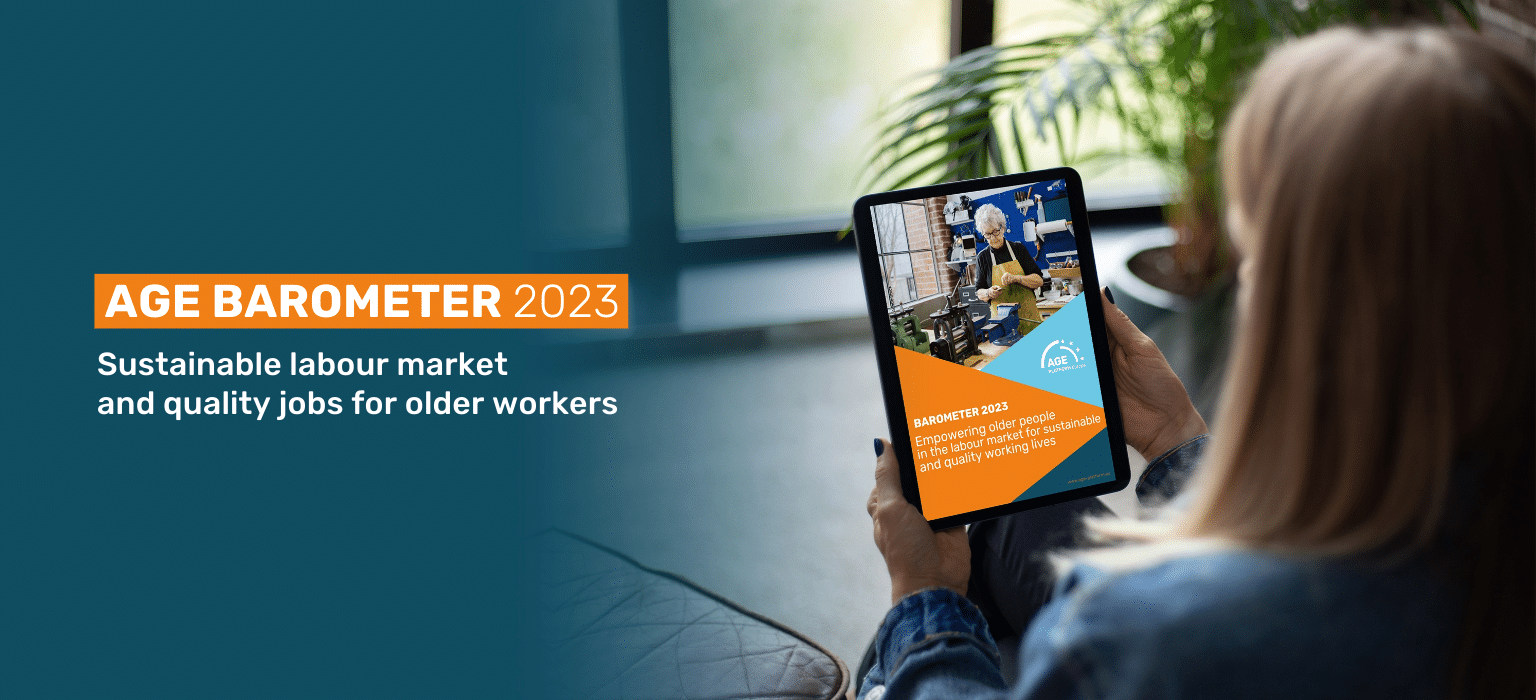Malta
Information provided by the National Association of Pensioners and desk research

Support in the labour market
The employment rate of Maltese between 25 and 64 years old is higher (81.1%) than the European employment rate (74.6%). This employment rate drops drastically after the age of 50 to only 63.7% for those aged between 55 and 64. However, in a policy note published in February 2020, the economist Aaron G. Grech of the Central Bank of Malta presented data on the proportion of full-time employees aged fifty and over, broken down by sector and occupational category. The data indicate that the share of older workers in many sectors including public administration, wholesale and retail trade, has been increasing over the last ten years. More surprisingly, it finds this increase in more physically demanding occupations, such as the agricultural, fishing and construction workforces. In contrast, relatively new service sectors, such as information and communication, have seen a decline in the proportion of older workers.
The National Strategic Policy for Active Ageing 2021-2027 made the following recommendations to increase the number of older and ageing workers in Malta: developing vocational training for older adults; improving healthy working conditions, age management techniques and employment services for older workers; combating ageism and age discrimination; implementing the tax and benefit system; encouraging mentoring programmes in professional organisations; and strengthening reconciliation work and informal care.
As of today, it is up to the individual to determine the choices relating to the management of his or her career path and professional mobility. Employers can advise or support the employee according to company policy. This applies to both the private and public sectors.
The acquisition of new skills or the improvement of qualifications is also the responsibility of the individual. In addition to the classical higher education qualifications, there are several platforms offering training opportunities specially focused on career transition. For example, Jobsplus, the Maltese Public Employment Service, offers courses aimed at helping individuals to acquire cross-cutting or specific skills related to the labour market. Similarly, the Institute of Public Services, which is the main source for the professional development of public employees in Malta, offers a tool available to mid-career employees with the objective of holistically assessing his or her competencies as part of an overall performance management programme. It allows the employee to assess his or her training and development needs. In addition, the programme provides career development paths and specialised training, as well as professional and personal development activities. Finally, the recruitment portal can also be seen as a tool to assist in the transition from one job to another within the civil service.
Among the support provided to older unemployed people in the labour market, the local employment agency Jobsplus has been running a Mature Workers Scheme. Part of the overall mission to “increase accessibility to the labour market through modernised and targeted services, while facilitating labour mobility and promoting investment in human capital”, the Mature Workers Scheme targets employers and self-employed people who hire people over 45 who have been unemployed for at least 6 months. These employers are encouraged by a reduction in their income tax, “up to €11,600 in tax deductions for the first two years of employment of each eligible employee. In addition, they have the opportunity to benefit from tax deductions up to 50% of the cost of the training, up to a maximum of 400€ per employee”.
In Malta, after remaining unchanged for several years, the retirement age started to increase in 2012 and has gradually risen aiming to reach sixty-five (65) by 2027. When a person reaches statutory retirement age, she can receive a retirement pension while continuing to work and without any reduction in pension entitlement. Those who remain in employment after the age of 65 continue to receive contributions which are taken into account in the final average for assessing pension entitlement. To encourage more people to continue working after retirement age, the Maltese government announced in 2021 a 5-years plan to exclude all pension income from taxation for working pensioners within five years. As part of this plan, the government has proposed to the parliament that around 20% of the pension income will no longer be considered part of the taxable income, while the amount not considered part of the taxable income will increase to 40%171. To go further in the support provided to pensioners who wish to continue working, the National Pensioners’ Association has suggested, that a register of pensioners wishing to bring their skills to the labour market should be easily identified
Age discrimination in employment
Since 2012, age has been one of the protected grounds of discrimination in the Equality for Men and Women Act. The Act prohibits discrimination on the grounds of age in the areas of employment, education and vocational guidance, especially addressing management, work allocation, training and working conditions.
This Act provides for the establishment of the National Commission for the Promotion of Equality (NCPE), whose role is to promote equality. It covers, among other things, age discrimination in employment, access to education and career guidance. The NCPE conducts general investigations to determine whether the provisions of the Act are being complied with. It also deals with complaints of a more specific or individual nature to determine whether the provisions are being breached in relation to the complainant and, where deemed appropriate, mediates such complaints. It also provides assistance, where necessary, to persons who have been discriminated against to assert their rights under this Act.
The National Strategic Policy for Active Ageing 2021-2027 provides policy recommendations against ageism and age discrimination. Moreover, the National Strategic Policy “recognises the significance of intersectionality” and highlights the necessity of addressing the diversity of the ageing population. In the programme, it is stated that “the National Strategic Policy for Active Ageing distances itself from homogenising discourses and grand narratives which make generalisations about ageing based upon common sense ». Among the measures and initiatives planned to tackle age discrimination :
Measure | Initiative |
Develop intergenerational programmes that include positive contact with older adults and are cooperative by all parties working toward a common goal. | • Launch an information campaign. • Create an abuse reporting centre and a victim support service for older persons. |
Ensure adequate education about ageing in primary and secondary schools, and post-secondary and tertiary institutions, that involve practical interactions with older adults. | • Include issues relating to ageing in curricula and put emphasis on inter-generational learning |
Educate all professionals and workers on the myths of ageing as it is essential that age prejudice and stereotypes about ageing do not take root in no occupational service | • Educate on how to recognise ageism through media campaigns. Educational material should also include what actions one should take if there are feeling discriminated against because of their age. |
The National Strategic Policy suggests also “several policy and legal measures with a specific approach to intersectional discrimination”. For older women, the strategy provides for a lifelong approach to the risks of gender inequalities that cause poverty among older women and gender gaps in pensions. With regard to discrimination against LGBTIQ older people, the policy includes a measure to establish a national working group to identify the common, but also different, social and health challenges faced by the LGBTIQ population. For older people from ethnic minorities, one initiative will be to develop a standard on cultural and linguistic sensitivity that will be continuously monitored and raise awareness for all, but also for older people in general. Finally, there is an initiative to study how service providers for people with disabilities treat older users.
Workplaces for all ages
The Malta Occupational Health and Safety Authority (OHSA) is responsible, among other things, for providing information on occupational health and safety matters and on the methods required to prevent occupational accidents, diseases or fatalities, as well as for monitoring compliance with the relevant occupational health and safety regulations and taking enforcement action where necessary. However, even though the new strategic plan 2022-2027 notes the ageing of the workforce and explains that this is a new challenge to be taken into consideration, no specific provision or measure is made for older workers or ageing at work.
In the Maltese Public Service, there is an Employee Support Programme (ESP) which aims to identify and address the needs of employees who are experiencing work and/or life difficulties. The programme offers counselling, support, workshops and awareness sessions for employees and managers but also sector-specific sessions addressing self-care, well-being, and mental and physical health. The overall aim is to enable employees to be healthier, more productive and provide a quality service. In addition, the formulation and streamlining of policies related to the employment conditions of public employees is carried out by the People Support & Wellbeing Directorate. The Directorate is the main point of contact for the relevant ministries on issues relating to conditions of employment, allowances, disciplinary matters, special leave and work-life balance measures. In both cases, there is a general approach, without specific attention developed to address these issues from the perspective of older workers.
Finally, in July 2021, two Maltese social partners, the Malta Chamber of Commerce, Enterprise and Industry and the General Workers’ Union, announced the launch of a digital tool promoting good practice in active ageing and intergenerational exchange. They signed a framework agreement aiming “a healthy, safe and productive working environment, to enable workers to remain in the labour market and to facilitate the transfer of knowledge and experiences between generations”.
This country assessment is part of the 2023 edition of AGE Barometer dedicated to employment, which you can download below. Find out more online here.
COUNTRY ANALYSIS
Contact

Sarah Loriato
Policy Officer on Employment and European Parliament Liaison
Sarah is in charge of AGE’s policy activities in the fields of employment, participation and active citizenship in old age. She also monitors EU initiatives on volunteering for older people and lifelong learning. She is responsible for the Task Force dedicated to on Employment, participation and active citizenship. Sarah also coordinates AGE’s relations with the European Parliament (EP).



